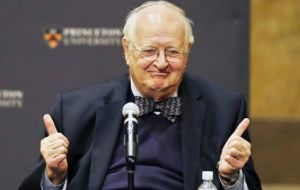MercoPress. South Atlantic News Agency
Economics Nobel for Scottish born Angus Deaton: understanding consumption great and small
 The headline from the academy that announced that Prof Deaton was its 2015 winner said: “Consumption, great and small”. What does this mean?
The headline from the academy that announced that Prof Deaton was its 2015 winner said: “Consumption, great and small”. What does this mean? The 2015 Nobel Prize for Economics has been awarded to Scottish-born economist Professor Angus Deaton, 69, who is currently professor of economics and international affairs at the Woodrow Wilson School of Public and International Affairs at Princeton University, in New Jersey.
The Royal Swedish Academy of Sciences, which awards the prize, said on Monday that Prof Deaton's work has transformed several fields of economics. More specifically, the organization said he had made an impact on economic theory, and on the practical application of data to investigate poverty, and devise economic policy.
The headline to the statement from the academy that announced that Prof Deaton was its 2015 winner said: “Consumption, great and small”. What does this mean?
Consumption, to an economist, means spending on goods and services by individuals and households. Understanding it means looking at how consumers allocate spending between different things, how they divide their incomes between spending and saving, and how these patterns vary over time.
The “great and small” in the academy's headline reflects Prof Deaton's analysis of consumer spending across a whole economy, and at the level of the individual and the household.
One theme that runs through the academy's analysis of his work is the extensive use of data on spending taken from household surveys. Previously, economists worked much more from aggregate data for the whole economy. This focus enabled Prof Deaton to produce a theoretical approach that was more consistent with the fluctuations in consumer spending that he found.
A more arcane achievement was in developing (with another economist John Muellbauer) a theory of demand for goods and services - how people allocate their spending between different products - that was motivated by problems in earlier analysis.
Their system, and subsequent improvements by other researchers, “has had an immense impact in academia as well as being greatly influential in practical policy evaluation”.
Prof Deaton has been an influential figure in development economics. The academy describes him as an important driving force in the transformation of this area of economics - in moving from aggregate data to household surveys.
To take one example - his research shed light on the question of whether rising incomes do lead to more calories being consumed, in other words to reducing malnutrition.
His work suggests that it does - so encouraging economic growth can help tackle malnutrition. If that were not the case it would be an argument for reorienting policy towards direct food aid.
Born in the Scottish capital of Edinburgh, Prof Deaton attended Fettes College, a private school in the city, before going on to study at Cambridge University. After teaching at Cambridge and the University of Bristol, he continued his economics career in the US. He holds both British and American citizenship.




Top Comments
Disclaimer & comment rules-

-

-

Read all commentsA great Prof and a great man.
Oct 13th, 2015 - 08:07 am 0He's talking about Mr. Market, pure and simple, just like all economists.
Oct 13th, 2015 - 12:02 pm 0If you placed all the economists in the world end to end they would never reach a conclusion
Oct 13th, 2015 - 04:47 pm 0Commenting for this story is now closed.
If you have a Facebook account, become a fan and comment on our Facebook Page!